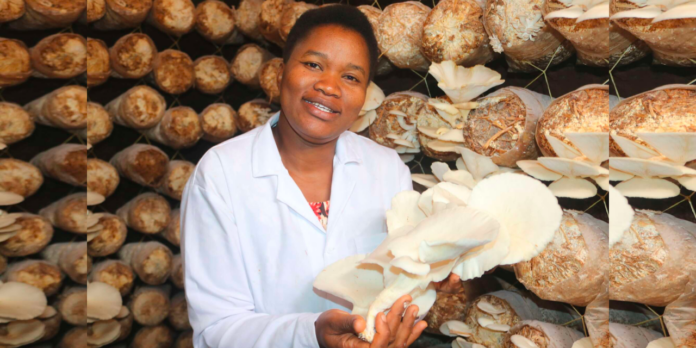Successful mushroom farming demands prior research and a good understanding from the onset. Many people perceive mushroom farming for commercial produce as a complex endeavour due to its intricacies.
Consolata Njeri is the founder of Connie Farm Fresh ‘N’ Organic Mushrooms. She established the business in 2017, a time when her future looked very bleak. Her initial capital in the mushroom business was Sh. 1800.
Njeri who hails from Kairi village in Gatundu was facing numerous heart-wrenching challenges at the time. She had just conceived her third child but tragically suffered a rupture.
Doctors put her on bed rest for the rest of her pregnancy. Concurrently, her husband abandoned her, at a time she needed his support the most
Njeri found herself burdened with pending bills. She was unable to navigate through the financial jeopardy she was in. Her work as an embroidery artist, designing tables, curtains and duvets, was halted due to the pregnancy rupture.
To make matters worse, her house was locked due to accumulated rent arrears. By good fortune, a samaritan helped her get a place to stay. This signal the start of a transformative journey.
Njeri, who holds a Certificate in Entrepreneurship, decided to look for other avenues that she could assist her dire situation and make money.
“I did online research and settled for mushroom business,” she said.
She visited a farm in Kakamega and found inspiration to start her own mushroom farm business. With no source of income, her mother gave her Sh. 1800 which was the initial capital.
“I began with 200 bags. Unfortunately, moulds destroyed all my mushrooms,” Njeri explained her first hiatus.
How mushroom farming can make you a millionaire
With nothing else to fall back on, Consolata Njeri sought refuge at her parents’ home. It was here that she rejuvenated her business concept and gradually expanded it from a small-scale operation to a larger one.
Today, her mushroom farm is one of the largest suppliers in the whole country. She owns two mushroom houses (for incubation & fruiting) and has collaborated with more than 50 farmers.
Inside Njeri’s farm
Njeri uses dry banana fibres, maize stalks, combs, sawdust, wheat and rice straws as growing media for the mushrooms.
These items are chopped into small pieces and soaked in lime, water and molasses drums. She uses dry sawdust to drain excess water.
“They are then put in wheat bran or cotton seed cake as supplements, then mixed until well distributed,” she explained in an interview with Nation.
“What follows is bagging. This involves compressing the substrates in small-sized polythene bags to make mushroom gardens.”
They steam these bags for two hours and later sterilize them before inoculating mushroom spores. A month later, they are transferred from the incubation to the fruiting house to grow and mature.
Consolata Njeri explains that her mushroom house is kept free of oxygen and light. She also maintains a temperature of 22°C to 25°C.
“Colonisation needs a high concentration of carbon dioxide. To achieve this, the bags and containers should be covered.”









